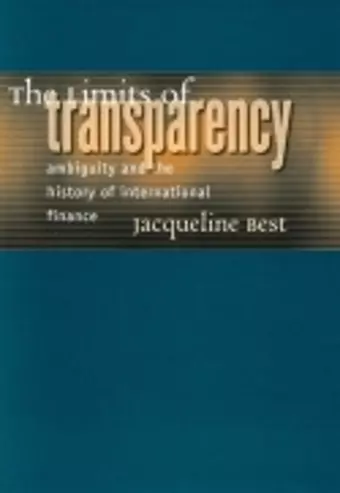The Limits of Transparency
Ambiguity and the History of International Finance
Format:Paperback
Publisher:Cornell University Press
Published:5th Feb '07
Currently unavailable, and unfortunately no date known when it will be back
This paperback is available in another edition too:
- Hardback£66.00(9780801443190)

A decade of crises has reminded us of the fragility of the international financial system. Conventional wisdom holds that uncertainty is the basic problem of financial governance, and attempts to contain ambiguity have dominated recent financial reform efforts. Jacqueline Best, however, contends that ambiguity can play a valuable role in international political and economic stability. The stability of the postwar era depended, Best suggests, on a carefully maintained balance between coherence and ambiguity. In her view, the collapse of the Bretton Woods exchange-rate regime was caused in large part by the increasing rigidity of the system and its corresponding inability to accommodate ambiguity.
This is a novel argument in an area much discussed by economists and political scientists. Their debate has focused on uncertainty as a technical problem and transparency as the solution. Although such policies are presented as technical, Best demonstrates that they are also political, have cultural consequences, and may prove counterproductive. Rather than assume that transparency is the ultimate goal, Best argues, we must recognize that ambiguity is pervasive, substantive, and potentially constructive. To read this book is to comprehend more deeply the ways in which politics is fundamental to economic theory and practice and to understand why the economy requires political leadership in order to flourish.
The Limits of Transparency demonstrates that many of the puzzles confronting us regarding the politics of money and finance can be unlocked if we move from a narrowly rationalist understanding of political economy to one also informed by constructivist insights. This book demonstrates that constructivism, done well, can be a model of theoretical clarity, empirically grounded, and can produce practical policy recommendations.
-- Kathleen R. McNamara * Perspectives on Politics *Jacqueline Best presents three forms of ambiguity: technical... contested... and intersubjective.... Having defined three types of ambiguity, Best sets out very ambitious objectives including reframing international theory, the history of Bretton Woods and—most important—redirecting contemporary policy debate.
-- Sylvia Ostry * Literary Review of CanaISBN: 9780801473777
Dimensions: 235mm x 155mm x 14mm
Weight: 454g
234 pages